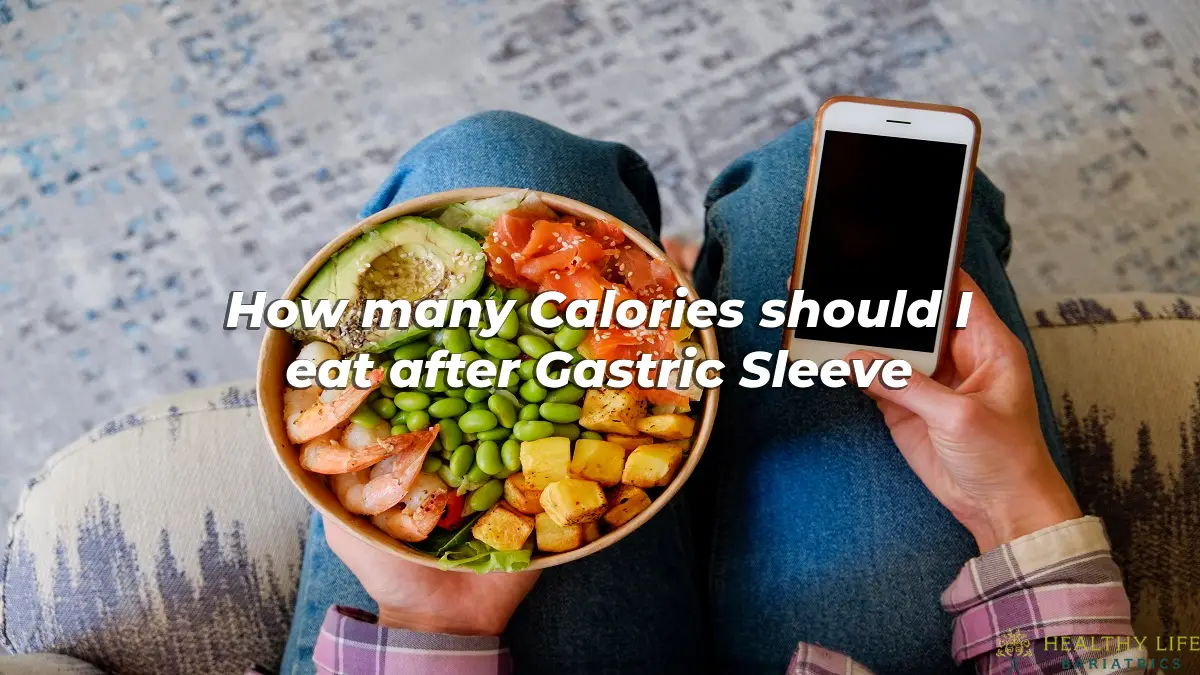After gastric sleeve surgery, the caloric intake is crucial for successful weight loss and overall health. According to the Academy of Nutrition and Dietetics, individuals typically should aim for 1,200 to 1,500 calories per day for women and 1,500 to 1,800 calories for men. This caloric range supports weight loss while ensuring adequate nutrition.
Energy balance plays a vital role in weight loss; it refers to the relationship between the calories consumed and the calories burned. To lose weight, one must create a caloric deficit, ensuring that energy expenditure exceeds caloric intake. However, it’s essential to consult a doctor or a registered dietitian before making any dietary adjustments, as they can provide personalized recommendations that align with individual health needs.
Focusing on adequate nutrition while adhering to these caloric guidelines after gastric sleeve surgery not only promotes weight loss but also supports overall well-being. Balancing your intake with high-quality nutrients can optimize recovery and long-term success.

In the first week post-surgery, it’s vital to focus on a carefully managed calorie intake to support your healing process. During this initial stage, your diet should consist primarily of liquid, pureed, and soft foods to allow your body to recover without additional strain.
Your caloric intake should ideally range between 400-800 calories per day. This moderate intake ensures you receive adequate nutrition while facilitating the healing process. Emphasizing hydration and nutrient-dense options, such as smoothies, broth, and pureed vegetables, will help meet your body’s needs during recovery.
It is crucial to consult with your dietitian for personalized guidance tailored to your specific health condition and nutritional requirements. They can help you navigate the best options to support your recovery. Remember, prioritizing nutrition during this first week post-surgery is essential for optimal healing and overall health.
During the second week post-surgery, patients typically remain on a full liquid diet. At this stage, recommended caloric intake focuses on supporting healing and overall nutrition. It’s crucial to aim for approximately 600 calories per day. This intake should include at least 60 ounces of fluids to stay hydrated and about 60 grams of protein daily to foster tissue repair and recovery.
The full liquid diet may include options such as smoothies, protein shakes, and soups, which can help meet these nutritional goals. However, it’s important to note that individual needs may vary. Personalized guidance from healthcare professionals is essential, as they can adjust these recommendations based on your specific recovery process and nutritional needs.
Maintaining adequate caloric intake, alongside proper hydration and protein consumption, plays a vital role in your healing journey during this second week. Prioritizing these aspects will not only aid in your recovery but also set the foundation for future dietary progress.

In the first month post-surgery, calorie intake is typically recommended to be between 400-800 calories per day. This period involves a gradual transition through different dietary stages, starting with a liquid diet, then moving to pureed foods, and finally incorporating soft foods. Adequate nutrition during this critical healing phase is essential to support recovery, but food restrictions must be considered to prevent complications.
Patients are encouraged to focus on nutrient-dense options within their calorie range to promote optimal healing while adhering to the necessary dietary guidelines. Collaborating with a dietitian during this time is vital, as they can provide personalized guidance tailored to individual recovery needs. A dietitian ensures that your calorie intake aligns with your progress and nutritional requirements, helping to create a balanced meal plan that fosters healing and supports overall health. Prioritizing both calorie intake and quality of nutrition will help to ensure a smoother recovery journey.
In the first to third week following gastric sleeve surgery, calorie intake typically ranges from 400 to 800 calories per day. This low-calorie range is essential as it allows the body to heal while adapting to the new stomach size. During this period, it’s crucial to focus on liquid, pureed, and soft foods that are gentle on the digestive system. Nutrient-dense options like protein shakes, broths, and pureed fruits and vegetables provide necessary vitamins and minerals without overwhelming the newly formed stomach pouch.
Prioritizing adequate nutrition within these restrictive calorie limits is vital for recovery. Insufficient nutrient intake can hinder the healing process and affect overall well-being. It’s important to select foods that are high in protein and low in sugar to support muscle healing and prevent nutritional deficiencies.
By adhering to this structured intake of 400 to 800 calories while maintaining nutritional quality, individuals can promote effective healing and establish a foundation for long-term health post-surgery.

In the first six months post-surgery, calorie intake recommendations typically suggest that most patients consume no more than 1,000 calories per day. This limited intake is crucial for healing and adaptation to the new stomach size, allowing the body to recover effectively.
To meet this calorie goal while promoting optimal recovery, it’s essential to focus on smaller, more frequent meals. Eating smaller portions throughout the day can help prevent overloading the stomach while ensuring adequate nutrient absorbance. Prioritizing nutrient-dense foods—such as lean proteins, healthy fats, whole grains, and a variety of fruits and vegetables—is vital. These foods provide the necessary vitamins and minerals to support healing without exceeding calorie limits.
By emphasizing small meals packed with nutrients, patients can achieve their calorie intake goals in a way that fosters a smooth recovery process and long-term health.
For patients six months to one year post-gastric sleeve surgery, a gradual increase in calorie intake is crucial for effective weight loss and long-term health. Initially, patients should aim for approximately 800 to 1,000 calories per day. As they progress and their bodies adjust, this intake can be increased to about 1,200 calories daily.
Around the one-year mark, some patients may find they can safely consume up to 1,500 calories per day while maintaining their weight loss goals. Adhering to these calorie guidelines is essential for successful weight loss and overall nutrition. Consuming an appropriate number of calories ensures that patients receive the necessary nutrients while minimizing the risk of weight regain.
Emphasizing nutrient-dense foods within these calorie limits will further support recovery and health. Monitoring portion sizes and being mindful of food choices can maximize the benefits of the gastric sleeve procedure. Following these calorie recommendations fosters a sustainable, healthy lifestyle post-surgery, aligning with the long-term success of the weight loss journey.

One year after gastric sleeve surgery, individuals can typically consume up to 1,500 calories per day while continuing to support weight loss. This amount allows for a balanced diet that can accommodate nutritional needs without exceeding caloric requirements.
According to the Academy of Nutrition and Dietetics, women generally need around 1,200 to 1,500 calories daily, while men may require between 1,500 to 1,800 calories, depending on factors like activity level and individual metabolism. It is crucial to prioritize nutrient-dense foods to maintain energy balance throughout the weight loss journey.
Patients are encouraged to focus on protein-rich foods, healthy fats, and plenty of fruits and vegetables, which can help sustain energy levels and promote overall health. Monitoring portion sizes and engaging in regular physical activity also play significant roles in achieving and maintaining weight loss goals post-surgery. By adhering to these recommended guidelines, individuals can effectively manage their calorie intake and support their weight loss efforts following gastric sleeve surgery.
One year after gastric sleeve surgery, the recommended daily calorie intake is typically around 1,200 to 1,800 calories for women and 1,500 to 2,200 calories for men, as outlined by the Academy of Nutrition and Dietetics. For those adhering to a very low-calorie diet (VLCD) post 6 months, the suggested range is about 800 to 1,200 calories per day.
Adhering to these caloric guidelines is crucial for effective weight loss following gastric sleeve surgery. By maintaining a calorie balance—consuming fewer calories than expended—individuals can achieve their desired weight loss results. Caloric intake must be managed carefully to avoid nutrient deficiencies while still promoting fat loss. Engaging with a registered dietitian can help tailor these recommendations based on personal health needs, ensuring that individuals receive adequate nutrition while adhering to caloric limits. This balance between calorie intake and energy expenditure is vital for long-term success in weight management post-surgery.